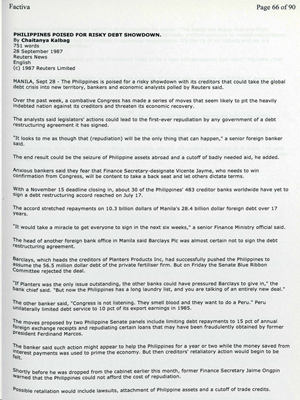PHILIPPINES POISED FOR RISKY DEBT SHOWDOWN
[Reuters]
Published date: 28th Sep 1987
28 September 1987
Reuters News
English
(c) 1987 Reuters Limited
MANILA, Sept 28 – The Philippines is poised for a risky showdown with its creditors that could take the global debt crisis into new territory, bankers and economic analysts polled by Reuters said.
Over the past week, a combative Congress has made a series of moves that seem likely to pit the heavily Indebted nation against its creditors and threaten its economic recovery.
The analysts said legislators’ actions could lead to the first-ever repudiation by any government of a debt restructuring agreement it has signed.
“It looks to me as though that (repudiation) will be the only thing that can happen,” a senior foreign banker Said.
The end result could be the seizure of Philippine assets abroad and a cutoff of badly needed aid, he added.
Anxious bankers said they fear that Finance Secretary-designate Vicente Jayme, who needs to win confirmation from Congress, will be content to take a back seat and let others dictate terms.
With a November 15 deadline closing in, about 30 of the Philippines’ 483 creditor banks worldwide have yet to sign a debt restructuring accord reached on July 17.
The accord stretched repayments on 10.3 billion dollars of Manila’s 28.4 billion dollar foreign debt over 17 years.
“It would take a miracle to get everyone to sign in the next six weeks,” a senior Finance Ministry official said.
The head of another foreign bank office in Manila said Barclays Plc was almost certain not to sign the debt restructuring agreement.
Barclays, which heads the creditors of Planters Products Inc, had successfully pushed the Philippines to assume the 56.5 million dollar debt of the private fertiliser firm. But on Friday the Senate Blue Ribbon Committee rejected the deal.
“If Planters was the only issue outstanding, the other banks could have pressured Barclays to give in,” the bank chief said. “But now the Philippines has a long laundry list, and you are talking of an entirely new deal.”
The other banker said, “Congress is not listening. They smell blood and they want to do a Peru.” Peru unilaterally limited debt service to 10 pct of its export earnings in 1985.
The moves proposed by two Philippine Senate panels Include limiting debt repayments to 15 pct of annual foreign exchange receipts and repudiating certain loans that may have been fraudulently obtained by former president Ferdinand Marcos.
The banker said such action might appear to help the Philippines for a year or two while the money saved from Interest payments was used to prime the economy. But then creditors’ retaliatory action would begin to be felt.
Shortly before he was dropped from the cabinet earlier this month, former Finance Secretary Jaime Ongpin warned that the Philippines could not afford the cost of repudiation.
Possible retaliation would include lawsuits, attachment of Philippine assets and a cutoff of trade credits.
“Importers will stop buying Philippine goods because they are liable to be seized by a creditor bank. Banks will go Into caucus with their governments to cut off trade preferences for Philippine products,” the bank chief said. Even a Philippine Airlines plane in New York will be liable for seizure.”
Repudiation of any debt would set off a chain reaction, he added. “The banks will argue that any fresh concessions to Manila will tempt other governments facing domestic political pressure to reopen negotiations. In effect, every country will be involved in perpetual negotiations. It’s the tip of an iceberg and we are beginning to have nightmares.”
“There’s blood on the carpet and the Philippines looks to be a new and dangerous test case,” the bank chief said.
He said the Philippines was likely to wait for the outcome of crucial talks, starting on October 2, between Brazil, which suspended interest payments on 68 billion dollars of debt in February, and its commercial bank ‘Creditors.
He foresaw fresh debt talks stretching over six months.
“At the end of next year anyway, Manila is due to be back at the table for new-money talks,” he added.
Even if a miracle occurred, the bank chief said, there was little possibility that interest rate cuts would be back-dated to January 1, 1987, as stipulated in the July debt accord.
“We are talking about 483 banks scrambling to calculate interest refundable on thousands of loans,” he said. “European and U.S. banks usually close their books on December 22, and nobody wants to go with inaccurate year-end figures.”






